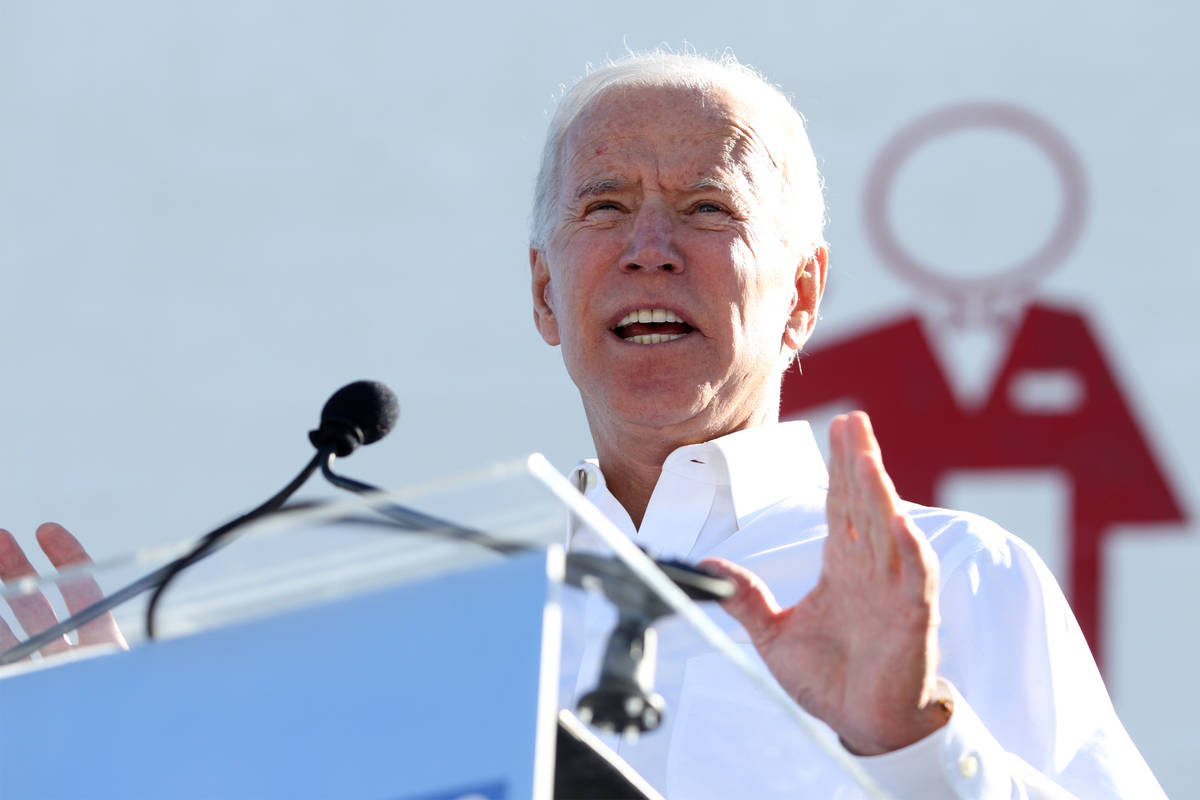
President Joe Biden won his first major legislative victory Wednesday when the House passed a $1.9 trillion coronavirus relief package that extends unemployment benefits, provides direct payments to workers and aid to cities and states.
“This legislation is about giving the backbone of this nation – the essential workers, the working people who built this country, the people who keep this country going – a fighting chance,” Biden said in a statement released by the White House.
The House voted along party lines to pass the bill, 220-211. Rep. Mark Amodei, R-Nev., voted against it.
Nevada is expected to reap a windfall of $4.5 billion in federal assistance to the state, counties, cities, tribes, schools, mass transit and other measures like child tax cuts and grants to boost tourism and travel industry businesses.
It also includes money to increase production of vaccines and distribute them to states to slow the spread of COVID-19 which has claimed more than 500,000 U.S. lives in just over a year.
“It will put shots in arms, money in people’s pockets, workers in jobs, and children safely back in schools,” said Rep. Dina Titus, D-Nev.
“We’re going to crush this virus,” said Rep. Steven Horsford, D-Nev., who like other Nevada lawmakers were instrumental in funneling federal funds to the state, one of the hardest hit by the pandemic.
Money needed in Nevada
Nevada was one of the top five states with the largest tax revenue drops, 10.6 percent, according to the Urban Institute.
The state also was second behind Hawaii for the highest unemployment rate in December, at 9.2 percent, according to the U.S. Bureau of Labor Statistics.
Democratic lawmakers tucked $350 billion into the bill to help states and cities that have budget shortfalls because of the coronavirus.
Even though Nevada was hit harder than many other states due to its lack of economic diversity, it was treated the same as other states in earlier relief bills approved by Congress. A funding formula to distribute federal aid to states and cities was altered at the request of Nevada and other states that rely on tourism to target the assistance to locations that needed help the most.
Titus worked with House Speaker Nancy Pelosi, D-Calif., to change the formula to take into account a state and city’s unemployment rate as part of the aid calculation.
Titus, Horsford and Rep. Susie Lee, D-Nev., backed the proposal to change the formula that benefitted Nevada.
Funding breakdown
Of the $350 billion to states and cities, Nevada governments will receive more than $4.5 billion due to the changes in the bill.
“Nevada is finally getting its fair share,” Titus said.
Clark County School District would receive roughly $835 million as part of funds to help reopen modernized schools and provide mental health, counseling and other services to students.
Transportation in the state would see funding for projects at McCarran International Airport and Regional Transportation Commission of Southern Nevada.
Workers making less than $75,000 per year would receive a one-time direct payment of $1,400, couples with an income of under $150,000 would receive $2,800.
Federal unemployment assistance of $300 per week would be extended to just past Labor Day, and small business owners could qualify for loans to keep doors open and workers employed.
Horsford pushed for extended unemployment aid and also tax credits to help working families that have struggled during the economic downturn.
Biden pushed for the hefty rescue package as pandemic continued to wreak havoc on the economy and thousands continued to die from COVID-19 infections. The Senate passed the bill 50-49 last week, with both Nevada Democrats, Catherine Cortez Masto and Jacky Rosen, supporting the measure.
The president is expected to make a prime time televised speech to the public Thursday evening.
He is expected to sign the legislation into law during a White House ceremony Friday.
Republican opposition
The bill passed the House and Senate over Republican opposition. GOP lawmakers cited the hefty price tag and calculated that the spending would create $4.1 trillion in new debt.
House Republican Leader Kevin McCarthy, R-Calif., said too much of the spending goes pet projects, foreign aid, and other measures not related to the pandemic.
“It showers money on special interests, but spends less than 9 percent on actually defeating the virus,” McCarthy said.
Republicans also said aid to cities was a bailout for public service pension plans that have been mismanaged over the years.
But lawmakers from states hard hit by the pandemic were quick to point out that the funding for local governments was needed to replenish coffers and keep essential workers on the job.
“The bill will provide Nevada and Clark County the flexibility we need to accelerate vaccine distribution, keep front-line workers on the payroll, and help get our economy back on track,” Titus said.
Contact Gary Martin at gmartin@reviewjournal.com. Follow @garymartindc on Twitter.